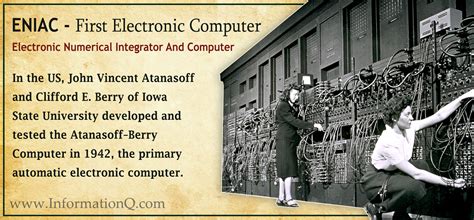Who Created The First Digital Computer

The creation of the first digital computer is a fascinating chapter in the history of technology, marking a significant milestone in the evolution of computing. While the concept of a "computer" has evolved over centuries, the digital computer as we know it today is a relatively recent invention, with its origins dating back to the mid-20th century. Let's delve into the story of the pioneers who laid the foundation for modern computing.
The Visionaries Behind the Digital Revolution

The journey towards the creation of the first digital computer involved the collective efforts of several brilliant minds, each contributing unique ideas and innovations. Here, we explore the key figures and their groundbreaking work.
John Vincent Atanasoff
John Atanasoff, an American physicist and mathematician, is often credited as one of the pioneers of digital computing. His work in the 1930s laid the groundwork for modern electronic computing. Atanasoff, along with his graduate student Clifford Berry, developed the Atanasoff-Berry Computer (ABC), which is considered by many to be the first automatic electronic digital computer.
The ABC, built at Iowa State College (now Iowa State University), was an innovative machine for its time. It utilized binary arithmetic and electronic circuits to solve systems of linear equations. While the ABC never went beyond the prototype stage and was not a general-purpose computer, it demonstrated the potential of electronic computing and inspired future developments.
Alan Turing: The Enigma Codebreaker
Alan Turing, a British mathematician, logician, and cryptanalyst, made significant contributions to the development of modern computing. During World War II, Turing played a crucial role in breaking German Enigma machine ciphers at Bletchley Park, England. His work on the Electrical Automatic Computing Engine (ACE) laid the foundation for the design of electronic digital computers.
Turing's theoretical work, including the concept of the Turing machine, provided a mathematical model for a general-purpose computer. His ideas influenced the design of early computers like the Manchester Baby and the Ferranti Mark 1, both of which were among the first stored-program computers.
Konrad Zuse: The German Innovator
Konrad Zuse, a German engineer and computer pioneer, is often regarded as the inventor of the first functional program-controlled Turing-complete computer. His creation, the Z3, was completed in 1941 and was the first fully functioning electromechanical computer. It could perform floating-point arithmetic and was used for calculations in the German aircraft industry during World War II.
Zuse's earlier machines, the Z1 and Z2, were experimental models that laid the foundation for the Z3. His work, however, remained largely unknown outside Germany until after the war.
John Mauchly and J. Presper Eckert
John Mauchly and J. Presper Eckert, both American engineers and inventors, designed and built the Electronic Numerical Integrator and Computer (ENIAC), which is often considered the first electronic general-purpose computer. ENIAC, completed in 1946, was a massive machine occupying about 1,800 square feet and weighing 30 tons. It could perform complex mathematical calculations much faster than any existing mechanical or electromechanical computers.
ENIAC's development was funded by the U.S. Army for calculating artillery firing tables. It was a groundbreaking achievement, demonstrating the power and potential of electronic computing.
The Early Computers: A Technical Overview

The early digital computers, while revolutionary, were vastly different from the sophisticated machines we use today. Let’s take a closer look at some of their key technical specifications and capabilities.
| Computer | Year | Technology | Memory | Processing Speed |
|---|---|---|---|---|
| Atanasoff-Berry Computer (ABC) | 1942 | Electronic, binary | 60 words (each word was 50 bits) | ~60 operations per second |
| Zuse Z3 | 1941 | Electromechanical | 64 words (each word was 22 bits) | ~0.5 operations per second |
| Electronic Numerical Integrator and Computer (ENIAC) | 1946 | Electronic, vacuum tubes | 20 words (each word was 10 digits) | ~5,000 operations per second |

These early computers were not only technically impressive but also marked a shift in the way complex calculations were performed. They laid the foundation for the development of more advanced and versatile computing machines.
The Legacy and Impact
The work of Atanasoff, Turing, Zuse, Mauchly, and Eckert, among others, paved the way for the modern computing era. Their innovations led to the development of more powerful and accessible computers, ultimately shaping the digital world we live in today. The legacy of these pioneers is evident in every digital device we use, from smartphones to supercomputers.
Frequently Asked Questions
What makes a computer “digital”?
+
A digital computer is a machine that processes information using discrete values, typically in binary form (0s and 1s). It operates by manipulating and storing data in a binary format, which allows for precise and efficient calculations.
How did these early computers impact the world beyond computing?
+
The development of digital computers had a profound impact on various fields, including science, engineering, and business. They revolutionized data processing, making complex calculations and simulations possible, which in turn led to advancements in areas like weather forecasting, nuclear physics, and aerospace engineering.
Were these early computers easy to use?
+
Far from it! Early computers were complex machines that required specialized knowledge to operate. Programming involved intricate wiring and complex instructions. User-friendly interfaces and graphical operating systems were still decades away.



